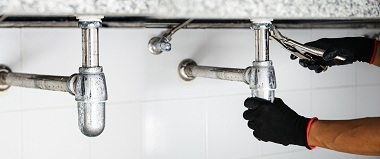For many, repeatedly blocked drains are a source of constant frustration, disrupting daily life and often leading to costly and time-consuming repairs. But what if we could turn this persistent problem into a rare occurrence?
In this comprehensive guide, we delve into the heart of the issue, unpacking the hidden mysteries behind those stubborn blockages. We’ll navigate through the maze of causes, from the sneaky buildup of organic matter to the silent invasion of tree roots. But, more importantly, we’ll chart a course towards long-lasting solutions, blending innovative technology, smart practices, and a dash of environmental awareness to keep our drains flowing smoothly and efficiently.
Understanding The Causes
Blocked drains are a common issue in many households and can be attributed to a variety of causes, which include:
- Accumulation Of Organic Debris: This includes common waste like food scraps, grease, and oil from kitchen sinks, as well as hair and soap scum in bathroom drains.
- Flushing Non-Flushable Items: This involves disposing of items like baby wipes, sanitary products, cotton swabs, and certain types of toilet paper that don’t dissolve well.
- Tree Root Intrusion: Tree roots seeking moisture can grow into and obstruct drainage pipes.
- Foreign Objects: Small objects like toys, jewelry, or other items can accidentally fall into drains.
- Pipe Deterioration: Aging pipes, especially those made from certain materials like cast iron, can corrode or break down, leading to blockages.
- Poor Pipe Installation: Improperly installed or designed plumbing can lead to frequent clogs due to inadequate flow or pipe misalignment.
- Hard Water Mineral Buildup: In areas with hard water, mineral deposits can accumulate inside pipes, reducing flow and causing blockages.
- Lack Of Regular Maintenance: Neglecting regular drain cleaning and maintenance can lead to the buildup of substances that eventually cause blockages.
- Excessive Rainfall Or Flooding: Heavy rains can overwhelm drainage systems, leading to backups and blockages.
- Ventilation Issues: Poorly ventilated drain systems can create pressure imbalances that hinder water flow and lead to clogs.
All these factors highlight the importance of mindful usage and regular maintenance of plumbing systems to prevent recurring drain blockages. And speaking of maintenance, hiring experts like LCL Plumbing can help ensure that your pipes are in tip-top shape at all times, avoiding any inconveniences.
Long-Term Solutions
This discussion will explore a range of strategies designed not just to clear blockages as they occur but to prevent them from happening in the first place.
1. Regular Drain Cleaning And Maintenance
Implementing a regular cleaning schedule using natural cleaners, such as baking soda and vinegar, can effectively prevent the buildup of grease, hair, and other debris. These substances are non-corrosive and safe for regular use, helping maintain clear pipes.
Moreover, professional drain cleaning services, when used annually or bi-annually, can remove deeper and more stubborn blockages that household cleaning methods can’t. They use specialized equipment like hydro-jetting and motorized drain augers to thoroughly clean pipes.
2. Proper Disposal Of Waste
Educate household members about the importance of disposing of grease and oil in the trash rather than washing them down the sink. Provide containers for collecting grease in the kitchen. Installing strainers in sinks and showers is also a simple yet effective way to catch hair, food particles, and other debris. Regularly cleaning these strainers is essential to prevent overflow and blockages.
3. Plumbing System Upgrades
Older pipes, especially those made of metal, are prone to corrosion and narrowing. Replacing them with modern materials like PVC or PEX can significantly reduce the likelihood of blockages and leaks.
Another ideal step is consulting with a plumbing expert to redesign and upgrade the plumbing layout to enhance flow efficiency. This might involve reducing the number of sharp bends or increasing the diameter of pipes in critical areas.
4. Tree Root Management
Scheduling regular inspections, particularly in properties with large trees near plumbing lines, can help identify root intrusions early. These checks often involve camera surveys to visualize pipe conditions. Furthermore, installing physical barriers or using chemical treatments can deter roots from invading and damaging pipes.
5. Use Of Enzyme Drain Cleaners
Enzyme-based cleaners work by breaking down organic matter in the pipes. These are environmentally friendly and safe for regular use, and they can significantly reduce the likelihood of organic clogs.
6. Addressing Hard Water Issues
In areas with hard water, installing a water softener can be a game-changer. These systems reduce mineral buildup in pipes, which is a common cause of blockages in such regions.

7. Improving Drain Ventilation
Proper ventilation is key to maintaining air pressure and flow within the drainage system. Regular checks and upgrades to ventilation can prevent problems related to slow drainage and gurgling sounds from drains.
8. Rainwater Management
Ensuring that your property has an effective and well-maintained system for rainwater drainage can prevent the overload of the household drainage system during heavy rains.
9. Investing In Trenchless Technology For Repairs
For repairing damaged pipes, trenchless technologies like pipe relining offer an efficient solution. These methods involve repairing pipes from the inside, thus avoiding extensive excavation and disruption.
10. Emergency Preparedness
Keeping essential plumbing tools (like plungers and drain snakes) on hand for immediate response to minor clogs and having a list of reliable plumbing services for more significant issues ensures quick action when blockages occur.
11. Regular Plumbing Inspections
Regular, comprehensive inspections by a qualified plumber can identify potential issues like small leaks, pipe damage, or early signs of blockages. Addressing these problems promptly can prevent more significant problems down the line.
Conclusion
Ultimately, the key to avoiding the inconvenience and expense of recurrently blocked drains lies in a blend of awareness, care, and preventive action. By adopting these long-term strategies, you can ensure a smoother, more efficient plumbing system, contributing to a hassle-free and more sustainable home environment.

